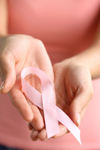 Extra, extra! From the annals of food cures come some natural foods that are found to pack a wallop against breast cancer. The latest health news in this culinary category is that a compound in parsley and celery, as well as other plant products, including fruits and nuts, could stop certain breast cancer tumor cells from multiplying and growing.
Extra, extra! From the annals of food cures come some natural foods that are found to pack a wallop against breast cancer. The latest health news in this culinary category is that a compound in parsley and celery, as well as other plant products, including fruits and nuts, could stop certain breast cancer tumor cells from multiplying and growing.
In the U.S. study, researchers exposed rats with a certain type of breast cancer to “apigenin”. This is a common compound found in parsley, celery and other plant products. The rats that were exposed to the apigenin developed fewer tumors and experienced significant delays in tumor formation compared to those rats not exposed to apigenin.
Researchers believe this could impact women who are taking certain types of hormone replacement therapy (HRT), which amounts to upward of 10 million Americans.
It is believed that certain synthetic hormones used in HRTs can accelerate breast tumor development. So the study exposed the rats to one chemical used in the most common HRTs, a progestin called “medroxyprogesterone acetate” (MPA). This also has been tied to breast tumor development.
When tumor cells develop in the breast in response to MPA, they encourage new blood vessels to form within tumors. The blood vessels then supply the needed nutrients for the tumors to grow and multiply. Researchers found that apigenin blocked new blood vessel formation, thereby delaying and even stopping the development of the tumors.
They also found that apigenin reduced the overall number of tumors. It is most prevalent in parsley and celery, but can also be found in apples, oranges, nuts, and other plant products. As it stands, we are not that aware of how effectively the body absorbs apigenin from food. Thus, there are no current recommendations on how much of these foods should be eaten.
But, they say that it appears having at least some apigenin in the blood is important in delaying the onset of breast cancer that progresses in response to progestins such as MPA. It’s probably a good idea to eat a little parsley and some fruit every day to ensure the minimal amount.
Alternatively, you can find the compound in pill supplements in the health-food section of many stores. Of course, you should always check with your doctor before making any major changes to your diet or lifestyle.
